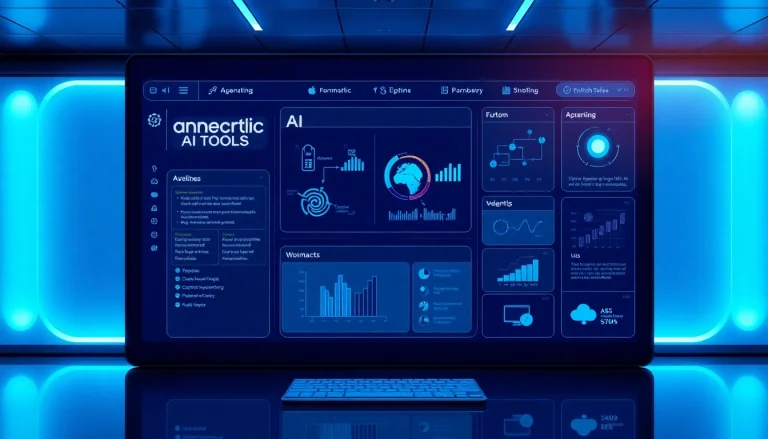
Introduction to AI Search Engines
The digital landscape is rapidly evolving, and search engines are no longer just gateways to information; they are becoming intelligent systems that transform how we interact with data. An AI search engine leverages cutting-edge artificial intelligence technologies to deliver search experiences that significantly enhance user engagement and satisfaction. As artificial intelligence continues to progress, these search tools are poised to redefine the standards for information retrieval, promising personalized and highly relevant content tailored to individual needs.
What is an AI Search Engine?
At its core, an AI search engine is an advanced software application that utilizes artificial intelligence to facilitate more intelligent and relevant searches. Unlike traditional search engines that primarily provide results based on keyword matching, AI search engines employ algorithms that understand user intent, context, and semantics. This means they can deliver results that are not only relevant but also contextually appropriate and personalized for each user.
Evolution of Search Engines to AI
The shift from traditional to AI-centered search engines is the result of advancements in machine learning, natural language processing, and big data analytics. Initially, search engines relied heavily on simple algorithms that matched keywords with index entries. However, as user expectations grew for more nuanced and contextual responses, the industry underwent a transformation.
Key milestones in this evolution include:
- Introduction of Semantic Search: Early AI developments focused on semantics, enabling search engines to understand the meaning behind queries.
- Machine Learning Algorithms: These algorithms analyze vast amounts of data to improve the relevance of search results over time through learning and adaptation.
- Natural Language Processing: The incorporation of NLP allows search engines to process and interpret user queries in natural language, making interactions more intuitive.
Benefits of Using AI Search Engines
AI search engines offer numerous benefits that enhance user experience and optimize information retrieval:
- Improved Accuracy: By understanding user intent and context, AI search engines provide more precise results, reducing the noise of irrelevant information.
- Faster Results: These engines can process queries more quickly, returning relevant information in real time, which is critical for users seeking immediate answers.
- Enhanced Personalization: AI algorithms can tailor search results based on user preferences and behavior, fostering a more engaging and relevant experience.
- Adaptability: As user trends and language evolve, AI search engines can adapt dynamically, ensuring they remain effective over time.
Key Features of AI Search Engines
Natural Language Processing Capabilities
Natural Language Processing (NLP) is a cornerstone feature of AI search engines, allowing them to understand and interpret human language. With NLP, search engines can grasp the nuances of language, such as intent, context, and sentiment, thus enabling more accurate and relevant search results.
For example, when a user queries, “best restaurants nearby,” an AI search engine can interpret that they are looking for dining options close to their current location and might even consider their previous preferences or dietary restrictions to deliver tailored recommendations.
Real-time Data Retrieval
AI search engines excel at real-time data retrieval, accessing vast amounts of information quickly. This capability is paramount in sectors such as e-commerce, healthcare, and news, where timely information is critical. AI search engines can fetch data from multiple sources within milliseconds, thus providing users with the most up-to-date information available.
Enhanced User Engagement through Personalization
Personalization is a defining feature of modern AI search engines. By analyzing user behavior, preferences, and past interactions, these systems can curate search results that resonate on a personal level. For instance, if a user frequently searches for vegetarian recipes, the AI search engine can prioritize similar content in future queries, creating a more engaging and tailored search experience.
Comparing Leading AI Search Engines
Overview of Top AI Search Engines
The landscape of AI search engines is rich and varied, with several platforms leading the charge. Some of the most prominent include:
- Google Gemini: Google’s venture into AI search integrates advanced machine learning to provide interactive search experiences.
- Perplexity AI: Known for combining generative AI with real-time web search, delivering structured answers alongside cited sources.
- Bing AI: Microsoft’s AI search experience incorporates conversational elements for more interactive searches.
- ChatGPT Search: OpenAI combines its conversational AI capabilities with web search, optimizing for real-time answers.
Performance Metrics: Speed and Accuracy
When evaluating AI search engines, two critical performance metrics are speed and accuracy. Speed refers to how quickly an engine can process a query and deliver results, while accuracy measures the relevance and correctness of the returned information.
For instance, Perplexity AI has been noted for its near-instant response times while maintaining a high level of accuracy in the context of search queries. In contrast, traditional engines may take slightly longer to deliver results due to their reliance on extensive database queries.
User Interface and Experience Analysis
The user interface (UI) of an AI search engine plays a significant role in the overall search experience. A well-optimized UI can enhance usability and satisfaction. For example, Bing AI incorporates a minimalistic design with clear pathways for user engagement, focusing on making the search process as seamless as possible.
Conversely, an overly complicated interface can hinder user experience and reduce engagement, emphasizing the need for intuitive design principles in AI search development.
Implementing AI Search Engines in Your Workflow
Best Practices for Effective Use
To maximize the benefits of AI search engines, consider these best practices:
- Define Clear Objectives: Determine what you aim to achieve by using an AI search engine, whether for research, content curation, or customer service.
- Train the AI: Many AI systems learn from user interactions. Providing feedback and refining search criteria can help improve accuracy.
- Leverage Customization: Utilize personalization features to tailor search outcomes based on user profiles and preferences.
Integrating AI Search into Business Solutions
AI search engines can enhance business operations by facilitating knowledge management and customer interactions. Companies can integrate these tools into their CRM systems, enabling customer service agents to retrieve information swiftly. For instance, when customers ask product-related questions, a well-integrated AI search engine can provide instant and relevant answers, improving customer satisfaction and retention.
Measuring Impact and Performance Indicators
To gauge the effectiveness of AI search implementations, it is essential to track key performance indicators (KPIs). Relevant metrics can include:
- User Engagement: Monitor how often users return to the search engine and their interaction duration.
- Result Accuracy: Evaluate the relevance of results by analyzing user interactions with the search outcomes.
- Search Speed: Measure the average time taken to retrieve results, aiming for a balance between speed and accuracy.
Future of AI Search Engines
Emerging Trends and Predictions
The future of AI search engines is set to be shaped by several emerging trends. As AI technology advances, we can expect:
- Increased Integration with Other Technologies: AI search will integrate more seamlessly with voice search, IoT devices, and AR/VR applications.
- Greater Emphasis on Privacy and Security: With privacy concerns on the rise, AI search engines will need to adapt policies to protect user data while still delivering personalized experiences.
The Role of AI in Search Evolution
AI will continue to play a critical role in reshaping the search landscape. As search engines evolve, we can anticipate shifts towards more conversational interfaces, where users will not only search for answers but engage in meaningful dialogues with their AI systems.
Preparing for Technological Advancements
Businesses and individuals alike must stay proactive in adapting to advancements in AI search. This includes continuous learning about new features, embracing AI-powered analytics tools, and advocating for responsible AI use to ensure that ethical guidelines are followed.
In conclusion, AI search engines represent a monumental step in the evolution of information retrieval. Their ability to understand language, provide rapid answers, and personalize results heralds a new era of user engagement. As these technologies evolve, they promise to enhance not only how we search but also how we interact with information in our daily lives.






